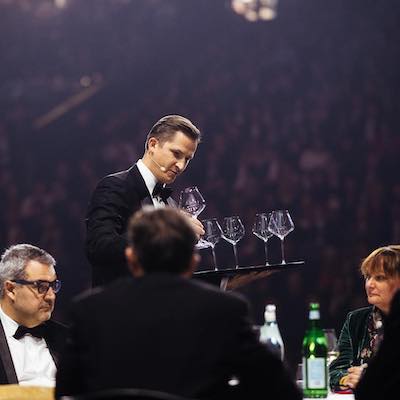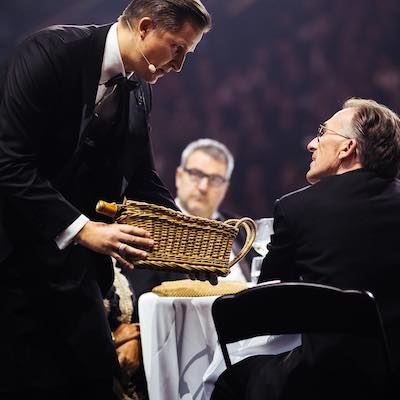The announcement that Reeze Choi, Raimonds Tomsons and Nina Jensen had beaten 14 other semi finalists to compete for the title of Meilleur Sommelier du Monde in Paris guaranteed that this year’s event would bring some kind of first. The victor would either be the first woman to win the prize, the first from China, or the first from the former Soviet bloc. The only disappointment was among French supporters that the trio allowed no chance for New York-based Pascaline Lepelletier to win the Trophy on her home turf. Lepelletier came fourth in the Semi-Finals after misunderstanding the instructions in a cocktail task.
Meininger’s associate editor, Robert Joseph, had a unique opportunity to watch the contest at close hand, watching all the 17 semi-finalists show their skills at at least one of the three tests they had to undergo, and then sitting on stage among the judges during the final which took place in front of a live audience of 4,500 plus several thousand more online spectators.
Joseph, for whom this last experience included being served – and having the chance to drink – a glass of Dom Perignon 2013, was impressed by all of the finalists and by most of the semi-finalists. “It was a very close fight” he said, “and especially after being on stage in Antwerp for the 2019 competition in which the German Marc Almert just beat Nina Jensen, leaving this year’s winner, Tomsons in third place.
While the ASI, the event organisers, work hard to make the contest a spectator sport, anyone outside the sommelier community, and even many of them, will have struggled to keep track of who was winning. Marks are scored through a combination of serving and tasting skills coupled with arcane knowledge of wines, spirits cocktails and even low and non-alcoholic drinks.
Difficult questions
In a close contest, points won or lost through the way a Champagne cork is presented to the judges or knowing the correct region, and/or name or price of a Chinese Baijiu can be crucially important. Small service details matter. Failure to mention that the Dom Perignon is a Champagne from France leads to a lost point, even though one might imagine the information to be superfluous to anyone ordering that particular product.
Identifying two white wines as Rieslings and identifying which was from Germany and which from Austria was tricky enough, but spotting that the following pair were Semillons from South Africa and Brazil was far harder.
The way a Champagne cork is presented to the judges or knowing the correct region, and/or name or price of a Chinese Baijiu can be crucially important.
All three finalists proved capable of recognising that a pair of anonymous reds were of high quality and from Bordeaux but, perhaps unsurprisingly, none imagined that they were two vintages of Château Petrus. As a previous winner acknowledged later, “we see lots of top wines, but even we rarely see Petrus and certainly not across many different years.”
The judges – all former winners of the title – also clearly had their own idea of the kind of service they would reward with the highest marks. One semi-finalist, for example, was penalised for not treating the judges with sufficient respect. The candidate’s chattier approach might have played better in a top restaurant in Sydney or Las Vegas than with the mostly European judges in Paris.
Across all these criteria, Tomsons who had already won the European title, appeared rarely to put a foot wrong, but from his viewpoint on the stage, Joseph admitted that, for most of the contest, he thought the Latvian and Dane were neck and neck, with Reeze coming in at a close third.
Meilleur Sommelier du Monde
Since its launch in 1969, The Meilleur Sommelier du Monde competition has become an event that genuinely deserves the overused adjective: unique. Which other professions - outside sports and the arts - can attract thousands of spectators who are ready to watch a hard-fought contest between participants from across the globe?
The fact that it only takes place every three years also sets this event apart, making more like the Olympics, for example than an annual event such as the Tour de France or a marathon. For a candidate to win at their fourth attempt, as Gerard Basset famously did represents a phenomenally long period of focused effort.
A watershed moment came in 1989 when Sinya Tasaki won for Japan at a time when the Japanese wine market was beginning to boom. His victory spawned an explosion of interest in wine service included the creation of a somm hero in a popular manga comic.
Since then candidates from a growing number of countries have triumphed, though none has so far lifted the prize for the US, and of course a woman has yet to win.

The Semi-Finalists (in order of success)
4 Pascaline Lepeltier, France
5 Wataru Iwata, Japan
6 Valeria Gamper, Argentina
7 Jo Wessels, South Africa
8 Andrea Martinisi, New Zealand
9 Suvad Zlatic, Austria
10 Sotiris Neophytidis, Cyprus
11 Tom Ieven, Belgium
12 Réza Nahaboo, Switzerland
13 Kai-Wen Lu, Taiwan
14 Manuel Schembri, Iceland
15 Mark Guillaudeu, USA
16 Francesco Marzola, Norway
17 Chuan Ann Tan, Malaysia
- Bujar Tukuli, Albania
- Andrea Mariana Donadio, Argentina
- Valeria Gamper, Argentina
- Paolo Saccone, Australia
- Suvad Zlatic, Austria
- Tom Ieven, Belgium
- Luís Otávio Alvares Cruz, Brazil
- Pier-Alexis Soulière , Canada
- Marcelo Arriagada Chocair, Chile
- Reeze Choi, China
- Nicolas Reines, Colombia
- Ivan Jug, Croatia
- Sotiris Neofytidis, Cyprus
- Jakub Pribyl, Czech Republic
- Nina Højgaard Jensen, Denmark
- Andres Jose Meschisi Murcia , Dominican Republic
- José María Aguirre, Ecuador
- Mikk Parre, Estonia
- Antero Niemiaho, Finland
- Pascaline Lepeltier, France
- Jaba Dzimistarishvili, Georgia
- Maximilian Wilm, Germany
- Aris Sklavenitis, Greece
- Juan Sebastian Giraldo, Hungary
- Manuel Schembri, Iceland
- Wicien Widjaja, Indonesia
- Anke Carmen Hartmann, Ireland
- Salvatore Castano, Italy
- Mattia Antonio Cianca, Italy
- Wataru Iwata, Japan
- Ratmir Akhmetov, Kazakhstan
- Raimonds Tomsons, Latvia
- Martynas Pravilonis, Lithuania
- Grégory Mio, Luxembourg
- Chuan Ann Tan , Malaysia
- Jeff Luciano Thomé, Mauritius
- Miguel Angel Maldonado, Mexico
- Bruno Scavo, Monaco
- Kamel Essbai, Morocco
- Adriaan Willem Eduard Visser, Netherlands
- Andrea Martinisi, New Zealand
- Francesco Marzola , Norway
- Jazmin Alejandra Gavigan Aguilera, Paraguay
- Gerardo Joseph Ruiz Acosta, Peru
- Ian Odilio Bitalac Santos, Philippines
- Kamil Wojtasiak, Poland
- Nelson Guerreiro, Portugal
- Adrian Jipa, Romania
- Vuk Vuletić, Serbia
- Joel/ Zhi Xian Lim , Singapore
- Mason Yin Song Ng, Singapore
- Rastislav Sutak, Slovakia
- Valentin Bufolin, Slovenia
- Jo Wessels, South Africa
- Jungmin AN, South Korea
- Diego Gonzalez Barbolla, Spain
- Ellen Franzén , Sweden
- Réza Nahaboo, Switzerland
- Kai-Wen Lu, Taiwan
- Nutawan Jumpanak, Thailand
- Elena Shishkina Hayat, Turkey
- Maryna Revkova, Ukraine
- Eric Zwiebel, United Kingdom
- Mark Guillaudeu, United States
- Federico De Moura, Uruguay
- Gustavo Rafael Garcia Escalona , Venezuela
- Khanh Vi Le Hoang, Vietnam
- Tawaanda Marume, Zimbabwe









